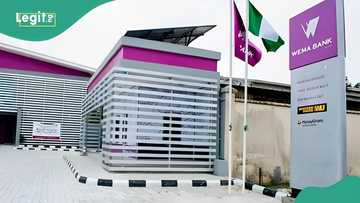Analysts Explain Implications of Fitch's Upgraded Ratings For Lagos, Kaduna, Two Others
- Lagos, Kaduna, and two other states have received a credit score upgrade, thanks to Fitch Ratings
- The global rating agency, however, noted that risks persist in the states despite the improvements recorded so far
- This is coming on the heels of a similar upgrade to Nigeria's sovereign credit ratings from the agency two weeks ago
Legit.ng journalist Ruth Okwumbu-Imafidon has over a decade of experience in business reporting across digital and mainstream media.
A global economic ratings agency – Fitch Ratings – has upgraded the Long-Term Foreign- and Local-Currency Issuer Default Ratings for four Nigerian states comprising Lagos, Kaduna, Kogi, and Oyo.
These states have now been moved from ‘B-’ to ‘B’, indicating improved macroeconomic indicators and a positive response to some of the recent policy reforms in the country.
Announcing the updated rating on Saturday, April 26, 2025, Fitch noted that the outlook for all four states was stable, even though some risks persist.

Source: UGC
Recall that Fitch recently upgraded Nigeria’s sovereign credit rating from ‘B-’ to ‘B’ on April 11, 2025.
It explained that the upgrade of the federal government's ratings was mirrored in the states due to the intergovernmental relationships.
As explained by Fitch Ratings:
"B ratings indicate that material risk is present, but a limited margin of safety remains. Financial commitments are currently being met. However, capacity for continued payment is vulnerable to deterioration in the business and economic environment.”
Why the revised ratings by Fitch?
According to Fitch Ratings, here are the reasons behind the ratings.
- A 20% + increase in federal VAT and oil-related transfers to the states, showing a presence of financial support.
- Steep depreciation of the Nigerian naira, now predicted to exceed N1500/$ between 2024 and 2028
- A high, but gradually declining inflation.
The agency warned the states about their external debt exposure, noting that it poses a risk, given the naira depreciation.
- Kaduna state had 86% of its direct debt denominated in foreign currencies as at the end of 2023, showing a high risk. The state, however, had 40% operating margins driven by internally generated revenues and federal allocations, which were described as strong. However, its debt service capacity was defined to be weak, based on its payback ratio of 18 times.
- Kogi state also had its debt portfolio as a mix between domestic and foreign borrowings to fund ambitious capital projects. Fitch highlighted a high vulnerability to the recent fluctuations in oil revenue, and this means a high risk.
- Lagos state also has 50% of its debt in foreign currencies, but its exceptionally high internally generated revenue moderates its risk. Where other states have IGR as 25% of total operating revenue, Lagos state has 75%, reflecting a strong fiscal position. The state also has a payback ratio of 5 times, expected to remain so till 2028. Alone, Lagos state’s credit profile was put at ‘b+’, to reflect strong financial metrics at the upper end of the ‘aa’ category, as well as its vulnerable risk profile.
- For Oyo state, its debt profile is largely domestic, meaning a reduced exposure to FX fluctuations. The state also has a solid payback ratio below 9 times, and a rise in federal allocations. The risk concerns come from its over-reliance on oil revenues.
Fitch Ratings noted that the financial profiles of the state have improved, but remain capped by Nigeria’s sovereign credit rating ceiling.
What's the implication of Fitch Ratings for Nigeria?
Commenting on the report, Samuel Oyekanmi, an investment analyst at Norrenberger, said that the upgrade from 'B-' to 'B' might seem negligible on paper, but makes a lot of difference.

Source: Getty Images
Oyekanmi told Legit.ng that it could attract more investors and help these states access the international debt market.
He said;
"Its a report that shows that if foreign investors who could also be borrowers choose to borrow to Nigeria, these states are potential less risky areas to consider."
Corroborating the statement, Ikemesit Effiong, partner at SBM Intelligence, explained in a chat with Legit.ng that the improved rating helps the states access loans at better rates.
His words;
"Ratings just increase the potential for these states to borrow more. If said borrowings are channeled towards infrastructure roll-out, there will be a direct benefit to residents in the state. In the end, policy formulation and execution will be the primary determinant of better living outcomes."
Lagos now second-largest economy in Africa
Earlier, Legit.ng reported that Lagos state secured a new position on the list of Africa's largest economies.
It was officially recognised as the second-largest economy, second only to Cairo, the capital of Egypt.
This advancement was driven by various commercial activities within the small state, including recent developments from the Dangote Refinery.
PAY ATTENTION: Сheck out news that is picked exactly for YOU ➡️ find the “Recommended for you” block on the home page and enjoy!
Proofreading by James Ojo, copy editor at Legit.ng.
Source: Legit.ng






